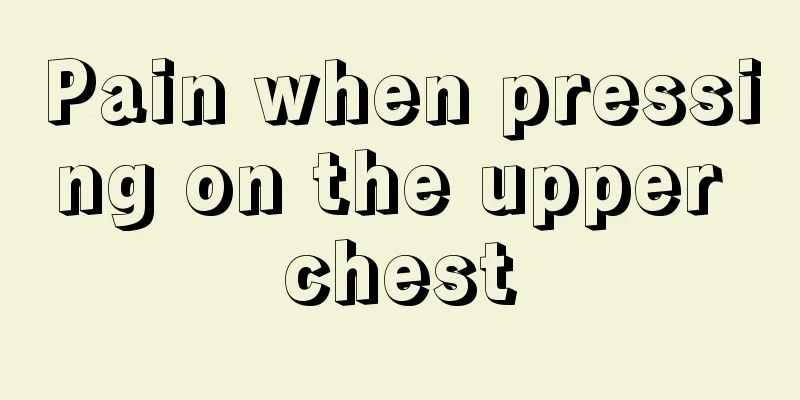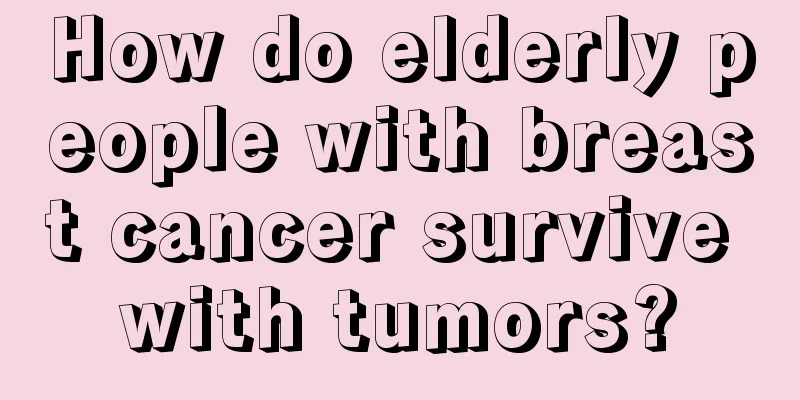Pain when pressing on the upper chest

|
I believe that in our lives some friends experience pain when pressing the upper part of the chest. Since the upper part of the chest is close to the heart, some friends think that it may be caused by some heart diseases, while others think that it may be related to nerve and inflammatory stimulation. The pain when pressing the upper part of the chest makes many friends feel particularly worried about it. So what is the pain when pressing the upper part of the chest? What are some good mitigation measures? Next I will introduce it to you in detail. If you feel pain in the upper chest and press above the heart with your hand, it means that the pain is in the chest wall, and the most likely cause is chest wall muscle spasm. The main characteristics of this type of chest pain are local tenderness. Changes in body position, chest movement, and deep breathing can aggravate the pain. It can also manifest as tingling, spasmodic pain, etc. The causes are mostly due to prolonged incorrect posture, bending over, leaning on a desk, strenuous exercise, local cold, etc., which cause chest wall muscle fatigue and spasm. This kind of chest pain is very common among computer workers. Other possible causes: 1. Chest pain caused by heart reasons: The most common is angina pectoris, which is paroxysmal and severe, mostly located in the precordial area, rarely above the heart, and there is no local tenderness, so it is not supported. 2. Rib lesions: The most common is costochondritis, which occurs in the 2nd to 4th costal cartilages in the upper chest. The local area may become thicker, raised, swollen, painful and tender, but there is no redness or swelling of the local skin. If you feel no lumps when you touch it, no local swelling, and no thickening of the ribs, the possibility is not high. 3. Intercostal neuralgia: The pain is often distributed along the intercostals, and is most obvious in the mid-axillary line, beside the spine, and beside the sternum. It is a stabbing or burning pain, and may be aggravated by turning around, taking a deep breath, or coughing. This does not match your situation. 4. Pleuritic chest pain: The pain is mostly located in the armpit or near the armpit, often accompanied by low fever, cough, shallow and rapid breathing, etc. It is recommended to go to the hospital's surgery department for treatment and let the doctor do a preliminary examination first, and then do relevant examinations according to the situation, such as chest X-ray, to clarify the cause of the disease. Prevention and treatment methods: 1. Relax your mind, pay attention to rest, avoid overwork, and keep warm to prevent cold. 2. Correct bad posture: Do not maintain a fixed posture for a long time, such as writing, reading, working, or operating a computer for a long time with your head down, so as to avoid continuous contraction of the head, neck, and chest muscles. 3. For areas with obvious tenderness, massage, local hot compress, etc., you can use antispasmodic and analgesic tincture or Voltaren, etc., apply it to the painful area, and local massage will have better effect. You can also apply the analgesic plaster to the painful area. |
<<: Pain when pressing on the edge of the chest
>>: What is causing chest pain and nausea?
Recommend
The preventive measures for cervical cancer are as follows
Cervical cancer occurs every year in China, and i...
Can I still drink red date yogurt during menstruation?
Yogurt is rich in nutritional value and has good ...
Infrared thermometer
In fact, when using infrared thermometers, they a...
Is hydrogen peroxide toxic?
Hydrogen peroxide is often used externally to dis...
Can drinking aloe vera soaked in water help lose weight
Aloe vera was an ornamental plant in the past, bu...
Is it good for children to have upper teeth first?
When the baby is about six months old, he or she ...
What are the symptoms of esophageal cancer polyps
Symptoms of esophageal cancer polyps include diff...
How to activate melanin_How to activate melanin
Our hair looks black and shiny mainly because of ...
What diseases can be checked by color Doppler ultrasound
When going to the hospital for a check-up, many d...
What causes gastric cancer
Gastric cancer is a common malignant tumor with a...
Preservative-free eye drops
In daily life, factors such as work or excessive ...
Is it true that nine out of ten Chinese men are weak?
If you ask what word men fear the most, "kid...
The effects and functions of Shouwu eggs
Shouwu is a plant and also a medicinal material. I...
What to eat to detoxify bean poisoning?
Green beans, also known as cowpeas, can be eaten ...
Treatment of chondroma, treatment and nursing need to be combined
Chondroma is a benign tumor. Surgical treatment i...









